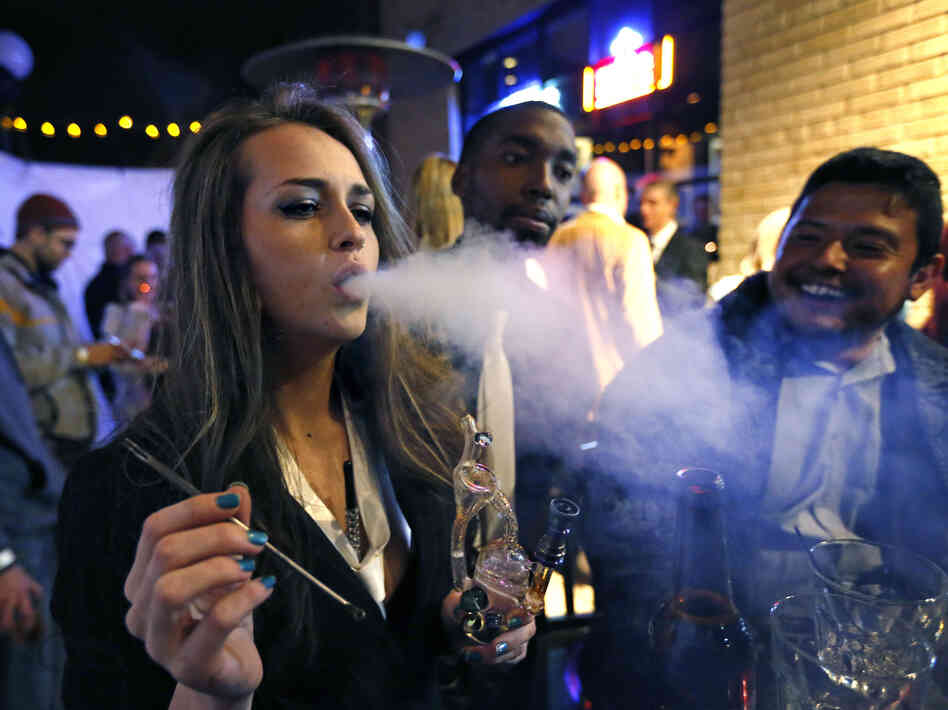Luke Skywalker
Super Moderator
{vb:raw ozzmodz_postquote}:
i i
hide captionPartygoers smoke marijuana during a Prohibition-era themed New Year's Eve party celebrating the start of retail pot sales, at a bar in Denver, late Tuesday Dec. 31, 2013.
Brennan Linsley/AP
Partygoers smoke marijuana during a Prohibition-era themed New Year's Eve party celebrating the start of retail pot sales, at a bar in Denver, late Tuesday Dec. 31, 2013.
Brennan Linsley/AP
The nation's first recreational pot industry opened in Colorado on Wednesday, kicking off an experiment that will be watched closely around the world and one that activists hope will prove that legalization is a better alternative than the costly American-led drug war.
Business owners who threw their doors open for shoppers at 8 a.m. are hoping the fledgling industry will prove to generate as much revenue as state officials hope it will. At least 24 pot shops in eight towns scrambled to get ready for the opening, increasing staff and inventory and hiring security.
More than a dozen people waiting in line outside one shop in Denver.
"We wanted to be a part of this movement," said Brandon Harris, who drove 20 hours from Blanchester, Ohio. "We're making history here."
Earlier, pot users welcomed the new year — and the new industry — by firing up bongs and cheering in a cloud of marijuana smoke at a 1920s-themed "Prohibition Is Over" party in downtown Denver.
Across town, a dispensary set up a food truck and coffee service for campers awaiting the opening of sales. Temperatures were in the upper 30s — balmy for a January night in Colorado — and revelers ditched hemp jackets and sweaters as they alternated between horn blowers and joints and bongs.
Skeptics worry the industry will make the drug more widely available to teens, even though legal sales are limited to adults over 21. They fear that the increased availability will lead to a rise in drug abuse and crime.
Preparation for the retail market started more than a year ago, soon after Colorado voters in 2012 approved the legal pot industry. Washington state has its own version, which is scheduled to open in mid-2014. Uruguay passed a law in December to become the first nation to regulate pot.
Pot advocates, who had long pushed legalization as an alternative to the lengthy and costly global drug war, had argued it would generate revenue for state coffers and save money in locking up drug offenders.
Still, setting up regulations, taxation and oversight for a drug that's never been regulated before took some time.
Colorado set up an elaborate plant-tracking system to try to keep the drug away from the black market, and regulators set up packaging, labeling and testing requirements, along with potency limits for edible pot.
The U.S. Justice Department outlined an eight-point slate of priorities for pot regulation, requiring states to keep the drug away from minors, criminal cartels, federal property and other states in order to avoid a federal crackdown. Pot is still illegal under federal law.
Police in the eight Colorado towns allowing recreational pot sales stepped up patrols to dispensaries in case of unruly crowds. Denver International Airport placed signs on doors warning fliers they can't take the drug home in their suitcases.
With the additional police patrols, the airport warnings and various other measures, officials hoped they have enough safeguards in place to avoid predictions of public health and safety harm from the opening of the pot shops.
They are aware of how many people, from across the country and around the world, were watching. "We understand that Colorado is under a microscope," Jack Finlaw, lawyer to Gov. John Hickenlooper and overseer of a major task force to chart new pot laws, recently told reporters.
There was no shortage of skeptics worried retail pot would endanger the public. A group of addiction counselors and physicians said they're seeing more marijuana addiction problems, especially in youths, and that wider pot availability will exacerbate the problem.
"This is just throwing gas on the fire," said Ben Cort of the Colorado Center for Dependency, Addiction & Rehabilitation at the University of Colorado Hospital.
Marijuana activists were hoping Colorado's grand experiment wouldn't be that noticeable after an initial rush of shopping.
"Adults have been buying marijuana around this country for years," said Mason Tvert, spokesman for the Marijuana Policy Project. "The only difference is that in Colorado they will now buy it from legitimate businesses instead of the underground market."

